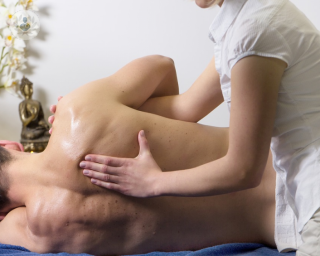What is shoulder tendonitis?
Tendonitis refers to the inflammation of a tendon, in which micro tears and areas of necrosis occur. Tendonitis in the shoulder can mainly affect the long portion of the brachial biceps and the muscles of the rotator cuff.

What is the outlook for shoulder tendonitis?
Physical therapy and exercise are usually effective when it comes to improving the symptoms and reducing shoulder pain. If these exercises do not work, surgery may be needed, otherwise the tendon may rupture completely.
What are the symptoms of shoulder tendonitis?
The symptoms of shoulder tendonitis are:
- Inflammatory pain
- Pain from pressure on the tendon
- Lack of strength
- Difficulty to perform daily activities
- Pain when performing active shoulder movements and pain when stretching the muscle tendon.
How is shoulder tendonitis diagnosed?
Tests to diagnose shoulder tendonitis are as follows:
- Ultrasound scan
- X-ray
- MRI scan
- Computed tomography scan (CT)
These tests and the detailed study of the patient's medical history usually provide an accurate diagnosis.
What causes shoulder tendonitis?
The main causes of shoulder tendonitis include:
- Older age (wear and tear)
- Repetitive movement in certain work activities or sports
- Poor blood supply to the tendons of the supraspinatus and infraspinatus muscles
- Sudden movements
- An imbalance of muscle groups closest to the humerus head
Can shoulder tendonitis be prevented?
Shoulder tendonitis can be prevented by following basic exercise guidelines, such as:
- Warming up the muscles before exercising
- Perform muscle strengthening exercises
- Stretching after sports activities
How is shoulder tendonitis treated?
Physical therapy is the appropriate treatment for tendonitis of the shoulder. The goal of this is to eliminate shoulder pain and improve joint stability and muscle strength. For this purpose, a series of exercises are performed that consist of mobilising the joint to avoid the loss of movement, and a deep massage of the affected tendon and stretching. In addition, other techniques can be performed, such as:
- Steroid injections
- Shockwave therapy
- Painkillers
- Surgery
Which specialist treats shoulder tendonitis?
Orthopaedic surgeons and physiotherapists are the two types of specialists that treat this condition.
11-13-2012 05-16-2023Shoulder tendonitis
Mr Mark Falworth - Orthopaedic surgery
Created on: 11-13-2012
Updated on: 05-16-2023
Edited by: Conor Lynch
What is shoulder tendonitis?
Tendonitis refers to the inflammation of a tendon, in which micro tears and areas of necrosis occur. Tendonitis in the shoulder can mainly affect the long portion of the brachial biceps and the muscles of the rotator cuff.

What is the outlook for shoulder tendonitis?
Physical therapy and exercise are usually effective when it comes to improving the symptoms and reducing shoulder pain. If these exercises do not work, surgery may be needed, otherwise the tendon may rupture completely.
What are the symptoms of shoulder tendonitis?
The symptoms of shoulder tendonitis are:
- Inflammatory pain
- Pain from pressure on the tendon
- Lack of strength
- Difficulty to perform daily activities
- Pain when performing active shoulder movements and pain when stretching the muscle tendon.
How is shoulder tendonitis diagnosed?
Tests to diagnose shoulder tendonitis are as follows:
- Ultrasound scan
- X-ray
- MRI scan
- Computed tomography scan (CT)
These tests and the detailed study of the patient's medical history usually provide an accurate diagnosis.
What causes shoulder tendonitis?
The main causes of shoulder tendonitis include:
- Older age (wear and tear)
- Repetitive movement in certain work activities or sports
- Poor blood supply to the tendons of the supraspinatus and infraspinatus muscles
- Sudden movements
- An imbalance of muscle groups closest to the humerus head
Can shoulder tendonitis be prevented?
Shoulder tendonitis can be prevented by following basic exercise guidelines, such as:
- Warming up the muscles before exercising
- Perform muscle strengthening exercises
- Stretching after sports activities
How is shoulder tendonitis treated?
Physical therapy is the appropriate treatment for tendonitis of the shoulder. The goal of this is to eliminate shoulder pain and improve joint stability and muscle strength. For this purpose, a series of exercises are performed that consist of mobilising the joint to avoid the loss of movement, and a deep massage of the affected tendon and stretching. In addition, other techniques can be performed, such as:
- Steroid injections
- Shockwave therapy
- Painkillers
- Surgery
Which specialist treats shoulder tendonitis?
Orthopaedic surgeons and physiotherapists are the two types of specialists that treat this condition.


Why does my shoulder hurt? The many causes of shoulder pain
By Mr Ioannis Polyzois
2024-12-13
The shoulder is the most flexible joint in the human body with the widest range of motion. It is involved in a great number of everyday activities, including reaching up to cupboards, reaching behind our backs and brushing our hair. Expert orthopaedic surgeon Mr Ioannis Polyzois explains. See more


Shoulder tendonitis: all you need to know
By Mr Richard Bryant
2024-12-13
Here, highly respected, experienced, and distinguished consultant orthopaedic surgeon, Mr Richard Bryant, discusses shoulder tendonitis in detail, including an outline of the main causes and symptoms. See more


Causes of shoulder pain and the Big Four
By Professor Mohamed Imam
2024-12-07
There are multiple joints and bones in the shoulder that connect with tendons and muscles to provide a wide range of motion in the arm. The tendons that keep the arm bone in the shoulder socket are called the rotator cuff, and this is where the range of motion comes from. However, problems may arise from such mobility. These problems may be temporary or continue and eventually require medical diagnosis and treatment. Professor Mohamad Imam, an exceptionally skilled orthopaedic surgeon specialising in upper limbs, talks about shoulder pain and ‘The Big Four’. See more


Skiing injuries to the shoulder: snow laughing matter!
By Mr Ioannis Polyzois
2024-12-05
Shoulder injuries are a common occurrence among skiers and snowboarders. We asked experienced orthopaedic surgeon Mr Ioannis Polyzois how these injuries happen, how they can be treated, and what steps you can take to avoid skiing injuries. See more
Experts in Shoulder tendonitis
-
Mr Richard Bryant
Orthopaedic surgeryExpert in:
- Elbow Pain
- Shoulder surgery
- Rotator cuff surgery
- Shoulder replacement
- Shoulder tendonitis
- Shoulder dislocation
-
Mr Ankit Desai
Orthopaedic surgeryExpert in:
- Shoulder tendonitis
- Rotator cuff injury
- Shoulder arthroscopy
- Shoulder surgery
- Osteoarthritis
- AC joint surgery
- See all

Thornbury Hospital - part of Circle Health Group
Thornbury Hospital - part of Circle Health Group
312 Fulwood Road, Sheffield S10 3BR
No existe teléfono en el centro.
By using the telephone number provided by TOP DOCTORS, you automatically agree to let us use your phone number for statistical and commercial purposes. For further information, read our Privacy Policy
Top Doctors

The Parkside Suite Heatherwood
The Parkside Suite Heatherwood
Heatherwood Hospital, High Street, SL5 8AA, Berkshire
No existe teléfono en el centro.
By using the telephone number provided by TOP DOCTORS, you automatically agree to let us use your phone number for statistical and commercial purposes. For further information, read our Privacy Policy
Top Doctors

The Parkside Suite Frimley
The Parkside Suite Frimley
Frimley Park Hospital, Portsmouth Road, GU16 7UJ
No existe teléfono en el centro.
By using the telephone number provided by TOP DOCTORS, you automatically agree to let us use your phone number for statistical and commercial purposes. For further information, read our Privacy Policy
Top Doctors
-
Thornbury Hospital - part of Circle Health Group
312 Fulwood Road, Sheffield S10 3BR, SheffieldExpert in:
- Cardiology
- Colorectal surgery
- Endocrinology, Nutrition and Thyroid
- endoscopy
- Fertility
- Otolaryngology
-
The Parkside Suite Heatherwood
Heatherwood Hospital, High Street, SL5 8AA, Berkshire, AscotExpert in:
- General Surgery
- Orthopaedic surgery
- Plastic surgery, reconstructive and aesthetics
- Obstetrics and Gynaecology
- Ophthalmology
- Urology
-
The Parkside Suite Frimley
Frimley Park Hospital, Portsmouth Road, GU16 7UJ, CamberleyExpert in:
- Cardiology
- Orthopaedic surgery
- Breast augmentation
- Dermatology
- Endocrinology
- Gastroenterology
- See all
- Most viewed diseases, medical tests, and treatments
- Ulnar nerve entrapment
- Peripheral nerve block
- Peripheral neuropathy
- Joint pain
- Lumbar herniated disc
- Spinal surgery
- Minimal access surgery (keyhole surgery)
- Shoulder pain
- Osteoporosis
- Anxiety





